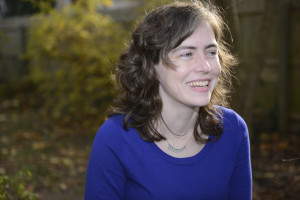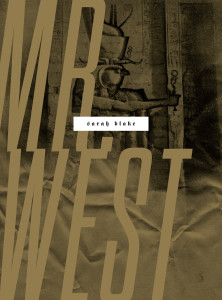 SARAH BLAKE lives outside of Philadelphia with her husband and son. She received a Literature Fellowship from the NEA in 2013. She’s editor at Saturnalia and co-founder of Submittrs. Find her online at sarahblakepoetry.com. SARAH BLAKE lives outside of Philadelphia with her husband and son. She received a Literature Fellowship from the NEA in 2013. She’s editor at Saturnalia and co-founder of Submittrs. Find her online at sarahblakepoetry.com. |
 Book Title, Press, Year of Publication:
Book Title, Press, Year of Publication:
Mr. West, Wesleyan University Press, 2015
Synopsis: An unauthorized lyric biography of Kanye West.
What do you think makes your book (or any book) a “project book”?
My book is a project book because all of the poems are about Kanye West, in one way or another.
Why this subject (or constraint)?
I wanted to write about hip hop. I love how hip hop embraces the speaker/rapper. It felt like everything I hadn’t been doing with my poetry, where I felt like I’d been hiding (my age, my sex, my tastes). I felt a connection to Kanye and I wrote a poem about him, and then, for over a year, I tried to write a poem about him every week. I was always a little surprised when I wrote another one.
Are you comfortable with the term “project book”?
Yes and no. I love the essay Dorothea Lasky wrote about projects, which came out right in the midst of my writing this book. Reading her essay made it very clear to me what judgments my poetry would face (and, especially worrisome, the judgments I would face). It made me scared and uncomfortable with the term. For a time, I didn’t want anyone to refer to my poems as part of a project. But holding a lot of the same reservations as Lasky does helped me push my project and myself. Now I embrace the term.
When I think about [insert any older male’s project book]—that’s quite obviously a project. But I don’t think I’ve ever heard anyone refer to it as such. Some might say that’s because he wrote it before we started using the terms “project” and “project book.” But I think it might be because people trust that his poems came from that deep, respectable poem place that poems are supposed to come from. Many people that read my poems do not trust that my poems came from that place. This could be because of their form or my age or my gender or any combination of things. But I think it’s easier to say it’s because the poems are part of a project.
Projects have been going on for a long time. A very long time. And the power of a project, of a theme, of a sustained thought or story—the power is undeniable. Project books can explore things differently, move differently, interact with readers differently. I think different is important to the innovation and evolution of poetry. Yes, some people won’t write them well. But some people will. And I will never underestimate poetry or the poets who take risks.
At any point did you feel you were including (or were tempted to include) weaker poems in service of the project’s overall needs? This is a risk, and a common critique, of many project books. How did you deal with this?
What I loved most about working on this book is how it changed my ideas of poems. How was I supposed to compare a two-page, three-voiced, quote-filled poem about Katrina to a short, tight poem about tweets or to a sestina about monsters? Was it the form or the content? The movement or the imagery? The serious or the whimsical? The research or the original thought? I have a totally different sense of what poems are capable of now, and it makes it very hard to compare them in terms of strong and weak.
But to answer the question more directly… Did I include weaker poems in service of the project? I didn’t, according to how I feel about the poems. I cut poems that didn’t work well enough on their own and poems that didn’t fit into the book. I included poems that don’t work as well without the other poems in the book, but I think they stand on their own. And I enjoy the way the poems lift each other up.
I think it’s pretty common for non-project books, too, to move through different moods and tensions to help shape the book’s experience as a book. This can result in weak spots, even if they’re weak spots a reader might appreciate in a single read-through. I imagine those moments are easier to tease out in a project book. But of course I worked not to have any.
Did you ever lose momentum, bore yourself, or worry that your project could not be sustained for a full-length book? How did you push through?
I never planned for my poems about Kanye to result in a full-length book, so I didn’t ever have any worries related to what I could or couldn’t sustain. But every week I wanted to write about him again and I wasn’t sure I would. Research is what pushed me through. Research always led to another quote or clip or fact that bothered me, and out of that bother a poem would usually come.
Do you have a sense of whether the fact that this is a project book helped position it to find publication more easily? Has it helped you find readers?
For the first question, I will say, being a project book did not help position my book to find publication more easily. It made it more difficult. But I couldn’t be happier with how it turned out.
Really I wanted to answer this question for the second question! Having a project book has definitely helped me find readers. It’s been one of the most gratifying parts of publishing these poems. Not only have I found readers outside of the poetry world, but I’ve made so many friends inside the poetry world. Poets who write to tell me they like the poems often start talking to me about Kanye, and before I know it we’re trading poems and talking about aesthetics. It’s been pretty incredible.
I said earlier how the power of a project is undeniable. I want to add that the appeal of a project is undeniable too. And why wouldn’t it be? And why should that be looked down on? If you’re so involved with an idea that all you want to do is write poems about it—that you feel true inspiration from it over and over—then of course you might find others that feel that way, but as readers, and you guys might really get along! What a joy!
After completing a project, how did you transition into writing something new? What are you working on now? Another project?
People terrified me about this one! So many times when I was writing my book, people asked how I would stop writing about Kanye and what I would write next. And at the time I didn’t know. I was legitimately stumped at how I could move past writing about him. He was involved in all of my poetic thought. If I was struck by how a branch looked on the sidewalk or how my ultrasound went, I found myself relating it back to Kanye. It would have been intolerable if it weren’t so amazing to open myself up to that sort of wild connecting and reaching and touching. But the answer took care of itself. When my son was born, I had trouble writing much of anything for about a year. When I started writing again, I wrote mostly about being a new mother and having a baby and trying to keep it alive all the time. (Just about everything can kill a baby. It’s ridiculous.) For the past two years, I’ve been on an NEA fellowship and I’ve been writing a ton of poetry. Right now I’m working on a book-length poem. If you told me I could write one a few years ago, I would have laughed at you, but I love working on one. And book-length poems are definitely projects.
What advice can you offer other writers, particularly emerging writers or poetry students who may be using the project book as a guiding principle for their own work?
Do anything you can to stay surprised by the work. Do anything you can to keep writing from smack-you-across-the-face out-of-nowhere inspiration. Get a mentor. Get two. Keep asking yourself why you’re writing this project and make sure the answer is changing and getting better.
(I started out writing about hip hop because I needed to in order to reclaim myself as a worthy voice in American poetry. I ended up writing about Kanye West because I wanted to talk about race and gender in America and American media, and I constantly questioned whether I had a worthy enough voice in American poetry to do that.)
Ask so much of yourself and your poetry that you can hardly write under the immense expectations you have of what poetry is capable of. And then write anyway.

